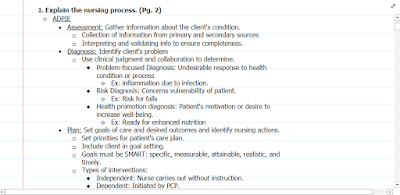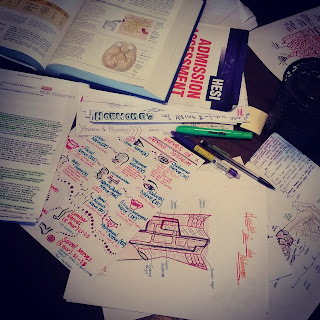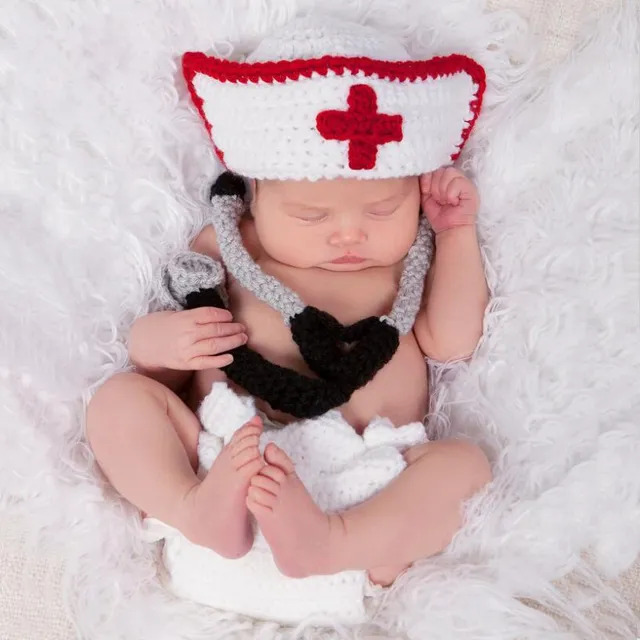If you have never been in nursing school before, you will soon learn that any one way of studying will not cut it. Throughout all of my pre-requisites, I would get study guides (What are those?!) from my teacher, go through them, and then draw diagrams to help me. That was that! When I took my first nursing school exams, I fell flat on my face. I tried to study the same exact way for Health Assessment, Pharmacology, and Foundations! If you are a veteran nursing student, you probably laughed just now! What was I thinking?!
The fact of the matter is that everyone is different. What will work for me, may not work for you. Regardless, you have to learn to adapt to the class that you are given, just as you will have to adapt to any patient that walks through the hospital doors. Using the same study methods for all of your classes will not fly, because each class focuses on a different concept or type of information. For example, Pharmacology focuses on facts and names of medications, while Med-Surg focuses more on the how-it-works for diseases. One requires memorization, while the latter requires an understanding of the whole picture.
Below I outline the primary ways that I studied in each of the classes that I listed. However, these are not the only methods I used in each class. Often times, you have to change the way that you study depending on how you do on the exams. As I explained, what works for me may not work for you, but below I have provided information on what study methods worked best for me and my courses.
I broke the following courses down by what percentage I felt was memorization and understanding. Here is what I mean by each:
- Memorization: The amount of the coursework that I simply memorized. (For example: definitions, lab values, side effects, etc.)
- Understanding: The amount of coursework that I had to make connections and grasp a full knowledge with. In other words, I had to see the bigger picture of how it works in order to learn the material (i.e. disease processes, nursing interventions, etc.)
*-*-*-*-*
Foundations of Nursing/Geriatrics: Textbook Review Questions & Powerpoints!
- Memorization: 30%
- Understanding: 70%
 |
| This is not wrong. Image retrieved from https://i.imgur.com/eKkFH9h.png |
At GCU, Foundations and Geriatric nursing were one in the same class. This posed an extra challenge, because they are two different subjects. The major thing with classes that are combined like this is to compartmentalize it separately. When you are writing down notes, try to use different colors or put them on separate pages when transitioning between the two concepts. Otherwise, you might end up thinking an exam question is asking about a geriatric patient, when it really is asking about a general adult patient (the answer is usually different!). Hopefully, your instructor structures the class to help you separate the two concepts without blurring the lines too much.
This was the only core nursing course in which I did not read the book, because it just did not seem to help me at all. However, the book cost me a good $350, so I felt bad not using it! Instead, I would make sure to do all of the review questions out of the book for every chapter that was talked about in class. Review questions are a HUGE help for almost every class in nursing school, but the questions found online for this class were just too vague for what I needed to know for my exams. If you do not have the stamina to read 350-500 pages a week (who does, honestly?), just go ahead and use the review questions in the book and read the chapter overviews at the beginning and/or end. Often times, nursing schools will pull questions directly from your assigned text. So getting those questions and the summary will give you a basic overview.
Using this method still does NOT substitute for learning the information. Since I did not read the text for this class, I had to get my information somewhere else. My professor provided awesome PowerPoints that were derived from the textbook. Since they were not as detailed as a textbook, I read through them three or four times each to make sure that I got the concepts down, and took notes in pen on the major topics.
Health Assessment: Homemade Study Guides!
- Memorization: 60%
- Understanding: 40%
 |
| One of my homemade study guides on OneNote. Note: the nursing process changed while I was in school from ADPIE to ADOPIE. |
This class was kind of a middle ground of understanding and memorizing. In some cases, you do need to understand the general reason why an abnormal finding is occuring, but you don't necessarily need the full picture at this point. It will be a little bit more memorizing of what is normal and what is abnormal for different age groups.
For this course, I would read the book and make my own study guide as I went along (only writing down questions and where to find it in the book, not writing any answers). Once I finished all of the reading, I would go back through the book and complete my study guide. Leading up to the exam, I would go over the study guide multiple times. This method allowed me to not only get an understanding of the topics by asking questions, but also made me re-read the information multiple times so that I would memorize the necessary assessment findings.
Pharmacology: Flashcards! Flashcards! Flashcards!
You may have already known this one, but pharmacology is primarily memorization. Students generally take pharmacology in their first block of the nursing program, so having a firm understanding of disease process that the medication is treating isn't necessarily the point of the class. However, you will have to have a general understanding of the mechanism of action for the drugs that you learn.
Luckily, my instructor gave my class a list of drugs and drug classes that could "possibly" be on the exam. So what I would do for this course is make flashcards for each of those drugs and drug classes. I would include on the card the: pharmacological name, brand name(s), class, action, uses, side effects, complications, and nursing considerations. Then, I would go through the cards over and over again leading up to the exam.
Medical-Surgical: Diagrams & Brain Maps!
Med-surg nursing was one hell of a class. If you have not already read my article about my "breaking point", this course brought me to the point of thinking I would not make it any further. The reason for this is because it was SO heavily based on understanding the concepts and how everything connected, and I was not at all prepared to do that. After trial and error, I came to understand just how to make my brain connect everything: through diagrams and brain mapping.
Brain maps were a study trick I learned in a high school history class. At that time, I did not believe in the magic that was brain mapping, and never used it again until the dreaded class that was Med-Surg. Brain mapping is simple. You write down the disorder in the middle of a piece of paper, then, you draw lines branching out from that word to different categories. For example, categories could include risk factors, complications, and nursing interventions. After you have your categories, you make many different branches to each of the items you need to know for that category. Once you do this, you should have something that looks like a web of information. When I do this, I imagine my brain developing neurons the neurons to connect all of the information just as I drew it out. It sounds ridiculous, but it works!
Diagrams are extremely helpful in this course, because it helps you understand how the disease works in the body. When doing diagrams, I try to draw out as much as I can and use minimal words, because it is easier for me to understand through visuals.
Note: Extra points if you draw diagrams and brain maps on a window in a public place. You feel like a mad genius as people walk by. ;)
Mental/Behavioral Health: Definition Lists & Outlines!
Mental or behavioral health requires some understanding of disorders, but for the most part it was just definitions. This may be in part to a limited medical understanding of many mental disorders compared to physiological ones. Don't get me wrong, there are still many behavioral disorders, like alcoholism and withdrawal, that you will have to understand in detail. But the majority of the disorders in this course just require a basic overview and memorization.
Because of this, I simply wrote out definitions. If there was a disorder that I needed to know in detail, then I would write out everything that I would list out everything that I felt was necessary to understand it.
Maternal & Pediatrics: Rewriting Information!
I took maternal and pediatric nursing in the third block, so at this point I had a firm understanding of some disease processes. Although these courses were still heavier on understanding than memorizing information, I felt that it was easier just to review the information by writing and/or drawing it out multiple times.
I reviewed the information multiple times by using different methods of doing so. This kept my attention and made it more fun than just re-reading a textbook. My first step was writing out my notes on paper. Then, I would organize and write out all of my notes on Microsoft Office's OneNote. Lastly, I would write out the information again on an available whiteboard or window.
Complex/Critical Care: Case Studies & Practice Questions!
- Memorization: 85%
- Understanding: 15%
 |
| Image retrieved from http://www.chegg.com/play/wp-content/uploads/sites/3/2018/01/flashcards.png |
You may have already known this one, but pharmacology is primarily memorization. Students generally take pharmacology in their first block of the nursing program, so having a firm understanding of disease process that the medication is treating isn't necessarily the point of the class. However, you will have to have a general understanding of the mechanism of action for the drugs that you learn.
Luckily, my instructor gave my class a list of drugs and drug classes that could "possibly" be on the exam. So what I would do for this course is make flashcards for each of those drugs and drug classes. I would include on the card the: pharmacological name, brand name(s), class, action, uses, side effects, complications, and nursing considerations. Then, I would go through the cards over and over again leading up to the exam.
Medical-Surgical: Diagrams & Brain Maps!
- Memorization: 10%
- Understanding: 90%
 |
| Diagrams of heart diseases drawn on the windows of my dorm's study room. |
Med-surg nursing was one hell of a class. If you have not already read my article about my "breaking point", this course brought me to the point of thinking I would not make it any further. The reason for this is because it was SO heavily based on understanding the concepts and how everything connected, and I was not at all prepared to do that. After trial and error, I came to understand just how to make my brain connect everything: through diagrams and brain mapping.
Brain maps were a study trick I learned in a high school history class. At that time, I did not believe in the magic that was brain mapping, and never used it again until the dreaded class that was Med-Surg. Brain mapping is simple. You write down the disorder in the middle of a piece of paper, then, you draw lines branching out from that word to different categories. For example, categories could include risk factors, complications, and nursing interventions. After you have your categories, you make many different branches to each of the items you need to know for that category. Once you do this, you should have something that looks like a web of information. When I do this, I imagine my brain developing neurons the neurons to connect all of the information just as I drew it out. It sounds ridiculous, but it works!
Diagrams are extremely helpful in this course, because it helps you understand how the disease works in the body. When doing diagrams, I try to draw out as much as I can and use minimal words, because it is easier for me to understand through visuals.
Note: Extra points if you draw diagrams and brain maps on a window in a public place. You feel like a mad genius as people walk by. ;)
Mental/Behavioral Health: Definition Lists & Outlines!
- Memorization: 60%
- Understanding: 40%
 |
| Mental health definitions written out on OneNote |
Mental or behavioral health requires some understanding of disorders, but for the most part it was just definitions. This may be in part to a limited medical understanding of many mental disorders compared to physiological ones. Don't get me wrong, there are still many behavioral disorders, like alcoholism and withdrawal, that you will have to understand in detail. But the majority of the disorders in this course just require a basic overview and memorization.
Because of this, I simply wrote out definitions. If there was a disorder that I needed to know in detail, then I would write out everything that I would list out everything that I felt was necessary to understand it.
Maternal & Pediatrics: Rewriting Information!
- Memorization: 40%
- Understanding: 60%
I took maternal and pediatric nursing in the third block, so at this point I had a firm understanding of some disease processes. Although these courses were still heavier on understanding than memorizing information, I felt that it was easier just to review the information by writing and/or drawing it out multiple times.
I reviewed the information multiple times by using different methods of doing so. This kept my attention and made it more fun than just re-reading a textbook. My first step was writing out my notes on paper. Then, I would organize and write out all of my notes on Microsoft Office's OneNote. Lastly, I would write out the information again on an available whiteboard or window.
Complex/Critical Care: Case Studies & Practice Questions!
- Memorization: 5%
- Understanding: 95%
 |
| Example of a case study diagram. Image retrieved from https://i.pinimg.com/736x/6d/27/fe/6d27fe2f75a7e43f1c8c046188182286--rn-school-gerd-nursing-school.jpg |
Although this course was the heaviest in understanding the bigger picture, it was not nearly as difficult as med-surg for me. This was because complex care was my final class of nursing school, and it was easier to connect the pieces at this point in the game. Complex care is not only about saving lives, but about understanding how all of the disease processes connect and how to care for real life patients that have more than just one problem.
The best ways that I figured out how to conquer this difficult course was through case studies and practice questions. Case studies are helpful in that you "draw out" your patient. This could be mentally or you could literally draw him or her out like in the photo above. You visualize what the patient looks like with this particular disease, then carry out care on this patient. You decide what labs and studies you should get started for him or her, then the interventions.
Complex care was the last course of nursing school for me, so the exams were designed to give us a better idea of NCLEX-style question. Because these questions were worded differently than what I was used to, I worked a lot of practice questions related to the subjects we learned about so that I could better my test-taking skills.
*-*-*-*-*
Mess around with new methods of studying and try to figure out what is best for you! Those first few weeks of a class are your chance to experiment. Hell, I even called the first exam my test-run exam, because I wanted to see how my study method impacted my grade. After your grades come back, make sure to reflect on your study methods and create a plan of action for the future.
*-*-*-*-*
Are you a veteran student nurse? If so, what study methods worked best for you in your courses? Leave a comment below about what worked for you! Make sure to like and share this article if you want more like it.
Follow me on Instagram @Jenna_Speight!










